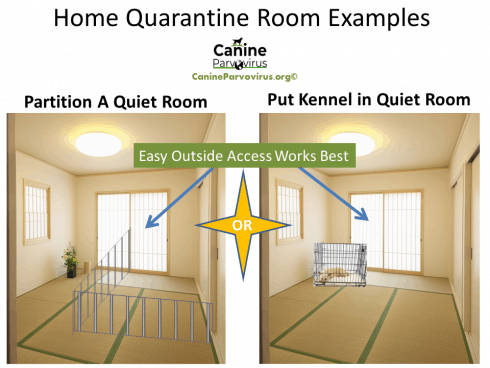Dr. When transferring puppies from shelters where parvo is a common occurrence, Swartz offers advice on best practices.
Ways to Isolate a Dog with Parvo
A dog with parvo should be left alone and given plenty of time to recover without interruption. Select a peaceful area of the house, preferably one with easy access to the outdoors. Due to their weakened immunity, parvo-infected dogs should be kept in a warm, draft-free environment.
A parvo-infected dog can be quarantined in a kennel or a room. If you decide on a space, think about using a kennel or free-standing dog pen to further ensure that your dog won’t spread the disease throughout the house. Here is an example room with 2 different setups:

FAQ’s Quarantine & Isolating Dogs with Parvo
Our first thoughts upon hearing the word “Quarantine” may be: solitary, chilly, and uncomfortable. Despite what you may be thinking, quarantine does not mean that to us. Wherever you decide to confine your dog, make sure it’s warm, quiet, and cozy. When recovering from parvo, dogs need as much rest as possible because their immune systems are compromised. A quarantine keeps the contagious viral particles contained and safeguards the sick dog from secondary infections.
What Treatment Options Are There for Dogs with Parvovirus?
There is no cure or direct treatment for Parvovirus. However, treatment is necessary to keep a dog alive if they contract the Parvovirus. This kind of treatment frequently focuses on symptom relief and immune system support for the dog.
Since they are undernourished, they will vomit up fluids. Fever and coldness are typical symptoms, but if you follow the doctor’s instructions, you can treat your sick dog at home. To treat the virus, a veterinarian will recommend anti-inflammatory medications, plasma transfusions, antiemetics, and antibiotics.
There are several ways to treat a dog with Parvovirus. Although there is no treatment for the illness, the veterinarian can offer supportive care. To aid in your dog’s recovery, the vet may administer intravenous fluids and electrolytes. Additionally, they could administer him medicine to lessen the nausea and avoid dehydration. Sometimes your dog will require antibiotics if he has a secondary bacterial infection.

FAQ
How long is dog contagious after parvo?
Adult dogs with parvo will remain contagious for about 4-5 days, and puppies with parvo can remain contagious for up to 10 days after a clinical recovery.
Should I separate my dogs if one has parvo?
When your dog has parvovirus, Hung advised keeping it away from other dogs until it has received treatment and recovered. “Owners of parvovirus-infected dogs should also be cautious of their belongings and clothing to prevent unintentionally infecting other owners and their dogs with the virus.” ”.
When can a parvo puppy be around other dogs?
Before introducing your puppy to any animals that might not be fully vaccinated, wait until they have received their first two shots. While you shouldn’t necessarily confine your dog inside, you should avoid places like dog parks and pet stores and limit your dog’s interactions with other canines.
How do you know when parvo is gone?
- Your Puppy Stops Vomiting. The canine parvovirus damages the entire digestive system by causing small intestines to bleed.
- Puppy Stops Pooping Bloody Diarrhea. …
- Your Puppy Starts Eating Normally. …
- Increased Activity.